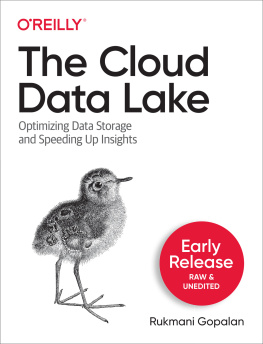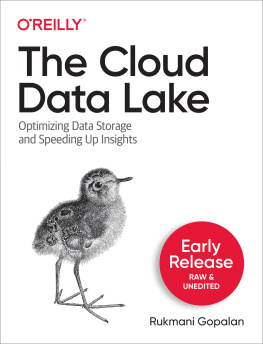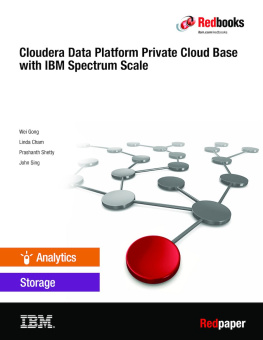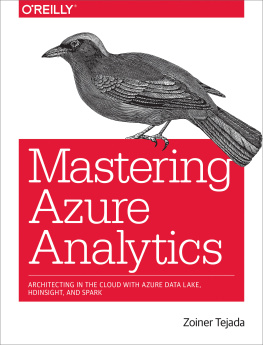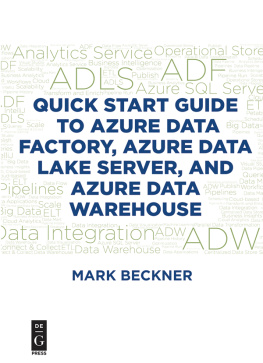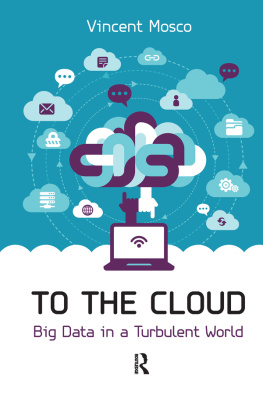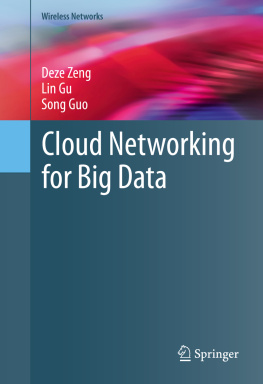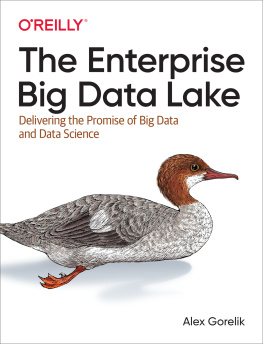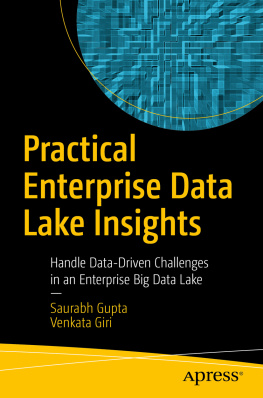Rukmani Gopalan - The Cloud Data Lake
Here you can read online Rukmani Gopalan - The Cloud Data Lake full text of the book (entire story) in english for free. Download pdf and epub, get meaning, cover and reviews about this ebook. year: 2022, publisher: OReilly Media, Inc., genre: Business. Description of the work, (preface) as well as reviews are available. Best literature library LitArk.com created for fans of good reading and offers a wide selection of genres:
Romance novel
Science fiction
Adventure
Detective
Science
History
Home and family
Prose
Art
Politics
Computer
Non-fiction
Religion
Business
Children
Humor
Choose a favorite category and find really read worthwhile books. Enjoy immersion in the world of imagination, feel the emotions of the characters or learn something new for yourself, make an fascinating discovery.
- Book:The Cloud Data Lake
- Author:
- Publisher:OReilly Media, Inc.
- Genre:
- Year:2022
- Rating:4 / 5
- Favourites:Add to favourites
- Your mark:
- 80
- 1
- 2
- 3
- 4
- 5
The Cloud Data Lake: summary, description and annotation
We offer to read an annotation, description, summary or preface (depends on what the author of the book "The Cloud Data Lake" wrote himself). If you haven't found the necessary information about the book — write in the comments, we will try to find it.
The Cloud Data Lake — read online for free the complete book (whole text) full work
Below is the text of the book, divided by pages. System saving the place of the last page read, allows you to conveniently read the book "The Cloud Data Lake" online for free, without having to search again every time where you left off. Put a bookmark, and you can go to the page where you finished reading at any time.
Font size:
Interval:
Bookmark:

by Rukmani Gopalan
Copyright 2022 Rukmani Gopalan. All rights reserved.
Printed in the United States of America.
Published by OReilly Media, Inc. , 1005 Gravenstein Highway North, Sebastopol, CA 95472.
OReilly books may be purchased for educational, business, or sales promotional use. Online editions are also available for most titles (http://oreilly.com). For more information, contact our corporate/institutional sales department: 800-998-9938 or corporate@oreilly.com .
- Editors: Andy Kwan and Jill Leonard
- Production Editor: Ashley Stussy
- Interior Designer: David Futato
- Cover Designer: Karen Montgomery
- Illustrator: Kate Dullea
- March 2023: First Edition
- 2022-05-03: First Release
- 2022-06-16: Second Release
- 2022-07-15: Third Release
- 2022-08-18: Fourth Release
- 2022-10-13: Fifth Release
See http://oreilly.com/catalog/errata.csp?isbn=9781098116583 for release details.
The OReilly logo is a registered trademark of OReilly Media, Inc. The Cloud Data Lake, the cover image, and related trade dress are trademarks of OReilly Media, Inc.
The views expressed in this work are those of the author(s), and do not represent the publishers views. While the publisher and the author(s) have used good faith efforts to ensure that the information and instructions contained in this work are accurate, the publisher and the author(s) disclaim all responsibility for errors or omissions, including without limitation responsibility for damages resulting from the use of or reliance on this work. Use of the information and instructions contained in this work is at your own risk. If any code samples or other technology this work contains or describes is subject to open source licenses or the intellectual property rights of others, it is your responsibility to ensure that your use thereof complies with such licenses and/or rights.
978-1-098-11652-1
[FILL IN]
Its 6 in the morning, your phone gently wakes you up, and automatically turns on your notifications. Your smart refridgerator reminds you that you need to order milk, and shows you an option to place an order to buy more milk since it knows you are running low. You do that and hop on your exercise machine, where you see personalized picks for you based on your workout routines. You get ready and eat breakfast without bothering to look at the clock because you know your phone will tell you when it is time to start driving based on what it has learnt about your commute and the traffic patterns. As you leave the door, your smart home assistant ensures the lights are turned off and the doors are locked. What would have seemed like science fiction a few decades ago is a regular day in our lives now. All this is made possible by the leaps technology has made in three key areas - devices that have made computing ubiqutous, connectivity that has shrunk the world by bringing the knowledge of the internet to these devices, and the technology (data/artificial intelligence/machine learning) that has helped devices learn patterns and make decisions. Data is now at the heart of how the world operates and organizations are increasingly relying on data to both inform and transform their business.
My mind goes back to 2013, when my own personal journey with data started as I worked on identity and personalization services for Microsoft Office. It was a year of great many learnings for me. I understood what it meant to develop cloud based applications, inclduing the nuances of building a direct to consumer experience vs an enterprise ready application. Most of all though, I was thrilled at the possibility of having a direct connection to customer experiences from these cloud services. When we shipped boxed products, i.e. products that shipped in a CD or DVD, and had customers install them on their devices, the only way for us to understand their experiences was to get anonymized telemetry data, organized user research studies or focus groups, or when the customer has issues through support cases. A lot of our insights on the product usage were based on the data from the customers who opted to talk to us, which was a minute fraction. With the cloud services I built, I had a real time understanding of my customers. This helped us tune our services and deliver more personalized experiences to our users. We were able to experiment with variations of features with our customers to better understand what helps more with their productivity. Since then, I have been working on various platforms and cloud services and I realize how the value of the data, when amplified with the elasticity of the cloud, can help inform and transform businesses.
I have engaged with hundreds of customers over the years across various industries, such as healthcare, consumer goods, retail, and manufacturing to name a few, and I have helped them with their big data analytics needs on the cloud. I have also driven the migration of my organizations on-premises analytics workload to the cloud for better cost management as well as taking advantages of emerging technologies in machine learning. Understandably so, each of these customers come to me with different motivations and problems. However, there is one common thread binding them all - which is the strong appetite to get value out of their data. The same customers who I was talking about the fundamentals of big data analytics five years ago have now progressed to running a very mature implementation, and running more of their business critical workloads on the data lake. As part of these conversations, there are a few key set of common questions and aspects that boil down to setting up, organizing, securing, and optimizing their data lake implementation. In the ideal scenario, these are baked into the data lake architecture design, and in some unfortunate instances, we talk about these issues when customers hit an issue/problem forcing a rearchitecture or design.
The promise of the infinite possibilities of leveraging a cloud data lake comes with the other side of understanding and handling the complexities involved in building and operationalizing a cloud data lake application. I believe that while the industry works on simplifying these offerings over time, a foundational understanding of the concepts of a cloud data lake solution goes a long way in building robust data lake architectures that stand the test of time. I have throughly enjoyed many conversations with my customers, partners, and teams in helping them build this foundational understanding and watching them be completely empowered to drive transformational insights for their teams or organizations.
In this book, I hope to condense all these conversations and the associated lessons learnt to provide an approach to data practitioners that will help you design a scalable cloud data lake architecture that informs and transforms your business.
This book is primarily targeted at data architects, data developers, and data Ops professionals to get a broad understanding of the various aspects of setting up and operating their cloud data lake. At the end of this book, the reader will have an understanding of the following.
The benefits of a cloud based big data strategy for their organization
Architecture and design choices including modern data warehouse, data lakehouse and data mesh
Guidance and best practices for designing performant and scalable data lakes
Font size:
Interval:
Bookmark:
Similar books «The Cloud Data Lake»
Look at similar books to The Cloud Data Lake. We have selected literature similar in name and meaning in the hope of providing readers with more options to find new, interesting, not yet read works.
Discussion, reviews of the book The Cloud Data Lake and just readers' own opinions. Leave your comments, write what you think about the work, its meaning or the main characters. Specify what exactly you liked and what you didn't like, and why you think so.

